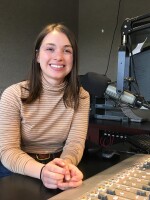The November election saw three citizen initiatives qualify for the ballot, with all of them garnering enough votes to become state law. But the Utah legislature’s replacement of the medical cannabis law outlined in Prop 2 has some voters wondering what’s the point in voting for those initiatives if they can be augmented by the legislature. House Minority Leader Brian King thinks voters can likely expect alterations to the other two initiatives in the future. KPCW’s Emily Means has more.
State Rep. Brian King, a Democrat who represents a portion of Summit County—where every ballot initiative passed in November—says he wouldn’t be surprised if lawmakers proposed legislation to make it more difficult to put a citizen initiative on the ballot.
"We have way too often our legislators ignoring what I think the will of the people is, and we saw that with Prop 2, medical cannabis; we saw it with Medicaid expansion in Prop 3; we saw it with Better Boundaries, the anti-gerrymandering measure in Prop 4; all those passed, and they passed because the legislature hadn’t been acting on those things, even though popular support was very strong for them," King said. "I don’t like the idea of putting in place even higher barriers than already exist to people in the state of Utah, feeling that their supermajority conservative legislature gets to call all the shots in terms of lawmaking, and the citizens don’t have meaningful access to exercise their state constitutional right to put initiatives on the ballot and have them come up for a vote."
King says his counterparts in Republican leadership have expressed a desire to change the full Medicaid expansion on the books from Prop 3—and one of the state senators representing Summit County, Republican Allen Christensen, is said to be sponsoring legislation to limit enrollment and add work requirements to qualify for coverage.
King says if adjustments are made to Utah’s Medicaid law, the estimated 150-thousand low-income Utahns who currently qualify will be in limbo, while the state waits for approval on a new Medicaid waiver from the federal government. He points out that, up to passing Prop 3 in November, the state had been waiting on approval for a limited expansion since the 2018 legislative session.
"But if we do that again with Prop 3, we’re going to wait another year or longer before we have a cut-back Medicaid expansion from what we just passed in November," King said. "I think all the Democrats are going to stand up and fight hard against any substantive reduction from what we’re talking about when we passed Prop 3 in November."
As for Prop 4, which established an independent redistricting commission to suggest voting districts to the state legislature, King says he’s hearing mixed messages, and that opponents will either make some adjustments at a legislative session or they’ll take Prop 4 to court. King was on the advisory council for the Better Boundaries initiative and believes Summit County to be gerrymandered.
“I hear them saying that they want to change it to make it so that the recommendation made by the independent commission would be advisory only and that we could change it in some fashion," King said. "Right now, as Prop 4 passed, we would have to vote that recommendation either up or down with no changes, and they want to give the legislature the ability to make changes to the independent commission’s recommendations. If you do that, you pretty much gut Prop 4."
Ultimately, King predicts legislators will be more aggressive in altering Medicaid expansion than the independent redistricting commission law this upcoming legislative session.


